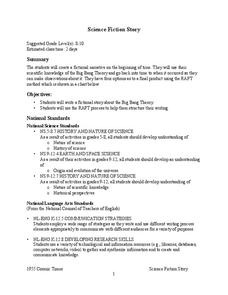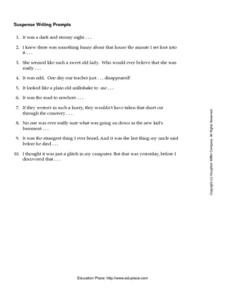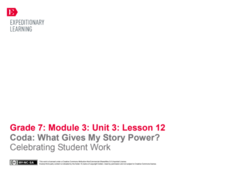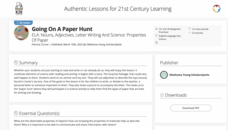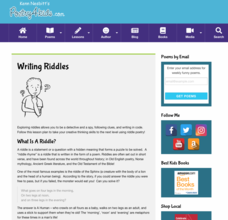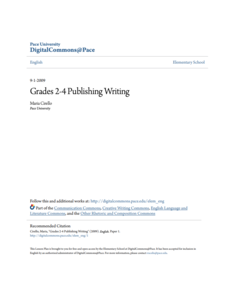Houghton Mifflin Harcourt
American Stories: Extra Support Lessons (Theme 2)
Here's a packet designed especially for those kids who need extra support with the basic concepts in the Houghton Mifflin Harcourt thematic units on American stories.
Curated OER
Compare and Contrast Versions of a Story
Compare and contrast reading passages with the ever favorite story of Cinderella. The versions in focus include an Italian version and a Native American story followed by three questions designed to share similarities and differences, as...
Curated OER
Express Yourself Lesson Seed 12: Story Event
Focus on plot and the impact-specific events in The Cay. Class members use their double-entry journals, created in a previous lesson in this series, to record their thinking about the guiding question as they read chapters 15 through 17....
Scholastic
Leads in Narrative Writing
The beginning, a very good place to start, is also a very difficult thing to craft. Provide your writers with this handout that identifies, and provides examples of, six different types of narrative leads.
Positively Autism
Spring Break Social Skill Story
Changes in routines can prove to be difficult for all kids, but especially for autistic learners. Here's a story designed to prepare kids for the change in schedule brought on by spring break.
NASA
Science Fiction Story
A lesson allows you to go back in time and see the big bang actually happen. Bazinga! In reality, pupils research the Big Bang Theory and theorize what it would be like to go back in time and see it happen. There are four different...
EngageNY
Creating Division Stories
Create your own adventure story ... well, not really. The fifth lesson in a 21-part series has pairs create story contexts for division problems. The lesson presents a step-by-step process for pupils to follow in writing such stories.
Curated OER
Identifying Setting: Expository Writing
Your class can take turns describing a well know location or setting without giving its name, and the rest of the class can try to identify the location, based on the details given. They chart the elements that helped in the...
Houghton Mifflin Harcourt
Silly Stories: Extra Support Lessons (Theme 1)
Kids who need extra support with the concepts in the Houghton Mifflin Harcourt thematic unit on silly stories, will benefit from this packet packed with skill builders, activities, exercises, and practice sets.
Core Knowledge Foundation
Unit 5: Realms of Gold - Vol. 2 Poetry and Short Stories Teacher Guide
Seventh graders have a golden opportunity to learn how to read poems and short stories with a unit that introduces them to the techniques writers use to craft their works. They examine poems by William Carlos Williams and Edgar Allen Poe...
Houghton Mifflin Harcourt
Suspense Writing Prompts
"I don't know what to write about!" How often have you heard that lament? Here's a list of 10 prompts that provide a starting place for suspense stories.
EngageNY
Two Graphing Stories
Can you graph your story? Keep your classes interested by challenging them to graph a scenario and interpret the meaning of an intersection. Be sure they paty attention to the detail of a graph, including intercepts, slope,...
K20 LEARN
A Way With Words: Copy Editing And The Writing Process
Learning to edit copy using correct grammar and mechanics is an essential skill in school—where scholars are called upon to edit their peers' writing—and in business. Class members practice this skill by first editing a provided article...
Curated OER
Do You Prefer Your Children's Book Characters Obedient or Contrary? Opinion Writing
With this New York Times "Learning Network" exercise, high schoolers read an article about the death of Maurice Sendak, author of Where the Wild Things Are and then respond to several prompts that require them to shape their own opinions...
EngageNY
Coda: What Gives My Story Power? Celebrating Student Work
It's time for a celebration! Scholars go on a gallery walk around the classroom to view their peers' completed illustrated children's stories. Using sticky notes, pupils provide feedback about the powerful elements they find in their...
K20 LEARN
Going on a Paper Hunt: Nouns, Adjectives, Letter Writing and Science - Properties of Paper
A lesson introduces scholars to nouns and adjectives. After listening to a short story and practicing creating adjectives with a card sort, pupils go on a paper hunt to locate different types of paper, complete a chart with adjectives,...
Curated OER
Descriptive Writing Using the Book Rumpelstiltskin
Use the fairy tale Rumpelstiltskin to teach your third grade class about descriptive writing. Following a teacher read-aloud of the story, the class brainstorms a list of adjectives describing the main character. Students use this list...
Curated OER
"The Story of an Hour" Lesson 2: Teacher's Guide and Notes
After reading background information about Kate Chopin, pupils complete their shared reading of her short story, "The Story of an Hour." Participants then consider the irony of the ending.
Curated OER
How Do Authors Use Imagery to Shape Their Writing?
Esther Forbes' award-winning Revolutionary War novel, Johnny Tremain and excerpts from Julie Otsuka's When the Emperor Was Divine are used to model how imagery brings alive the setting of a story. The young writers then craft their own...
Poetry4kids
How to Write an Apology Poem
Put a silly spin on making amends with an apology poem. Budding poets think of a time they were made to apologize although they didn't mean it. They then turn their experience into a poem that offers details and ends with an explanation...
Curated OER
Postcard Template
Practice writing short letters with postcards. The resource includes two pages to make four postcards. The first page has space for drawing, and the second includes a place to write, address lines, and stamp spaces.
Poetry4kids
Writing Riddles
What's got 60 eyes, 150 fingers, and an endless number of ideas? Your language arts class! Challenge young writers to come up with clever riddles with an online poetry lesson.
Pace University
Publishing Writing
Scholars become familiar with tagline literature with the help of the story, Alexander and the Horrible, No Good, Very Bad, Terrible Day by Judith Viort. After a read-aloud and whole-class discussion, leveled groups complete several...
Curated OER
How Do Adjectives Improve Writing?
Using adjectives to create vivid descriptions is the focus of exercises in this resource. A cloze reading activity asks class members to add missing adjectives to passages from Mark Teague's The Lost and Found. They then read Teague's...
Other popular searches
- 4th Grade Writing Stories
- Writing Stories With Similes
- Writing Stories and Setting
- True False Writing Stories
- Writing Stories Fantasy
- Writing Stories Lesson Plans
- Spooky Writing Stories
- Writing Stories About Food
- Writing Stories and Computer
- Adventure Writing Stories
- Creative Writing Short Stories
- Circular Stories Writing







